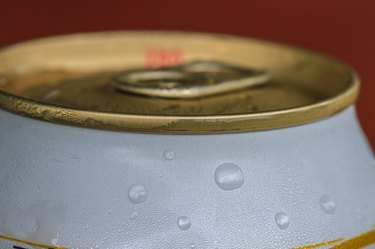
Some people mistakenly think that because diet drinks usually contain sugar alternatives, they are low-glycemic -- have a low impact on blood sugar and don't cause rapid blood glucose increases like high-glycemic foods. If you're using the glycemic index as a method for meal planning, it's crucial to know that some diet drinks influence your blood sugar.
Glycemic Index 101
Video of the Day
The glycemic index, or GI, ranks foods from zero to 100 based on how quickly they raise blood sugar. Your body absorbs high-GI foods quickly, causing a rapid blood sugar increase. Conversely, low-GI foods are digested slowly, resulting in a more steady rise in blood glucose. Foods considered high GI have a score of 70 to 100, while a moderate GI is 50 to 70, and a low GI is below 50. If you're following a low-GI diet for diabetes management or weight control, you'll need to choose low-GI beverages.
Video of the Day
Low-Glycemic Sweeteners
Check the food label to find out what the drink is sweetened with. Certain natural sweeteners, sugar alcohols and most artificial sweeteners have a low GI. Stevia, agave syrup, brown rice syrup, barley malt syrup, coconut palm sugar, fructose and yacon syrup have a GI below 50, according to Jennie Brand-Miller, author of "The Low GI Shopper's Guide to GI Values." Sugar alcohols such as xylitol, lactitol, mannitol, sorbitol, isomalt and erythritol have very little effect on blood sugar as well.
Moderate- to High-Glycemic Diet Drinks
It's good to know which diet drinks may have a moderate glycemic index so you can plan accordingly. Maple syrup, black strap molasses, high-fructose corn syrup, golden syrup, refiners sugar, inverted sugar, sucrose -- table sugar -- caramel and sorghum syrup have a moderate GI. Sweeteners in the high-GI category include trehalose, glucose, dextrose, maltose and maltodextrin. Someone following a low-glycemic diet will need to avoid moderate and high-glycemic foods and beverages.
Keeping in Balance
Even though diet drinks have fewer calories and some are low-glycemic, it's crucial to avoid drinking soft drinks in excess. As with the rest of your diet, moderation is key. Researchers warn that consuming excess sugar substitutes, such as sugar alcohols and artificial sweeteners, may contribute to obesity, according to a study published in the September 2012 issue of the journal "Obesity Review." Aim to have a well-balanced diet, beverages included.